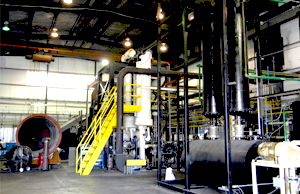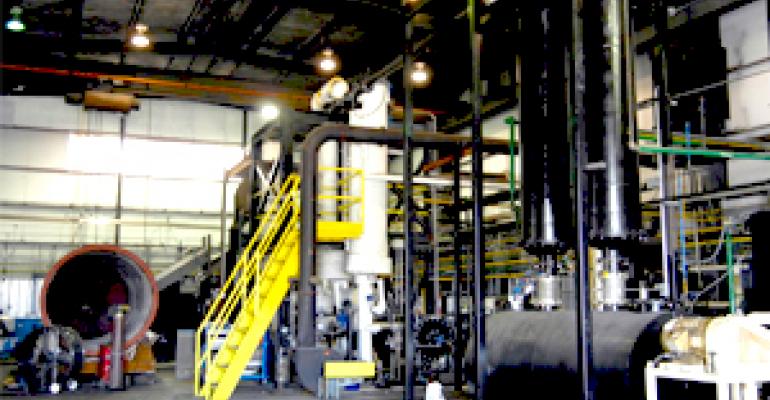
Waste plastic from Chrysler Canada’s Brampton Assembly Plant is helping to keep neighboring factories running instead of eating up precious landfill space.
JBI, an Ontario-based company, has developed technology that converts waste plastic to fuel ranging from heating oil to diesel.

“Because plastic is made from the same hydrocarbons that make regular fuel, we can make and blend what we want,” CEO John Bordynuik tells Ward’s. “It can also be used to make plastic again.”
And there is no shortage of waste plastic. The U.S. Environmental Protection Agency estimates some 30 million tons (27.2 million t) of the material is tossed into America’s landfills every year.
JBI’s Plastic2Oil technology heats shredded plastic and collects gaseous hydrocarbons in a reactor. The byproduct of this process then is condensed to liquid fuel.
Plastic2Oil takes less than an hour to process an 1,800-lb. (816-kg) load of plastic, recovering about 86% of the material’s energy content, Bordynuik says.
JBI’s plant in Niagara Falls, NY, generates more than 100 barrels of fuel for every 20 tons (18.8 t) of plastic it processes. All grades of plastic can be accommodated with Plastic2Oil, Bordynuik says.
To date, only polyethylene terephthalate – the plastic used to make soda bottles – is widely recycled. “And Coke buys all that anyway,” he adds. “We’re looking for all the other plastics.”
They contain higher hydrocarbon concentrations. “Therefore, we get a higher yield of fuel.”
Fuel oil appears to have the most market potential. “There’s just so many factories that need fuel,” Bordynuik.
JBI recently inked a deal to deliver fuel to Oxy Vinyls Canada, that country’s sole manufacturer of vinyl resins.
“Transportation fuels have much higher standards, which we can meet,” Bordynuik says. “But they require many more additives and there’s a lot more regulation involved.”
Then there is the prospect of producing more plastic.
“The light naphtha stream that we make can be used by the refinery to make virgin plastic because we’ve broken down the molecules into their virgin form,” Bordynuik says. “If you took plastic and you melted it and created something new with it, the bonds are much weaker.”
Chrysler is mum on its dealings with suppliers but welcomes the environmental benefit of technologies such as Plastic2Oil.
“Chrysler Group is committed to being environmentally responsible and creating a sustainable future,” spokeswoman Jodi Tinson says in a statement. “Being able to divert plastic waste from landfills to processes that provide meaningful solutions is one way that we can demonstrate that commitment.”
JBI has had discussions about taking waste plastic from General Motors plants, Bordynuik says.
The process represents an alternative for plants struggling to reduce their environmental footprint. “It’s not costing money to dispose of it or handle it.”





